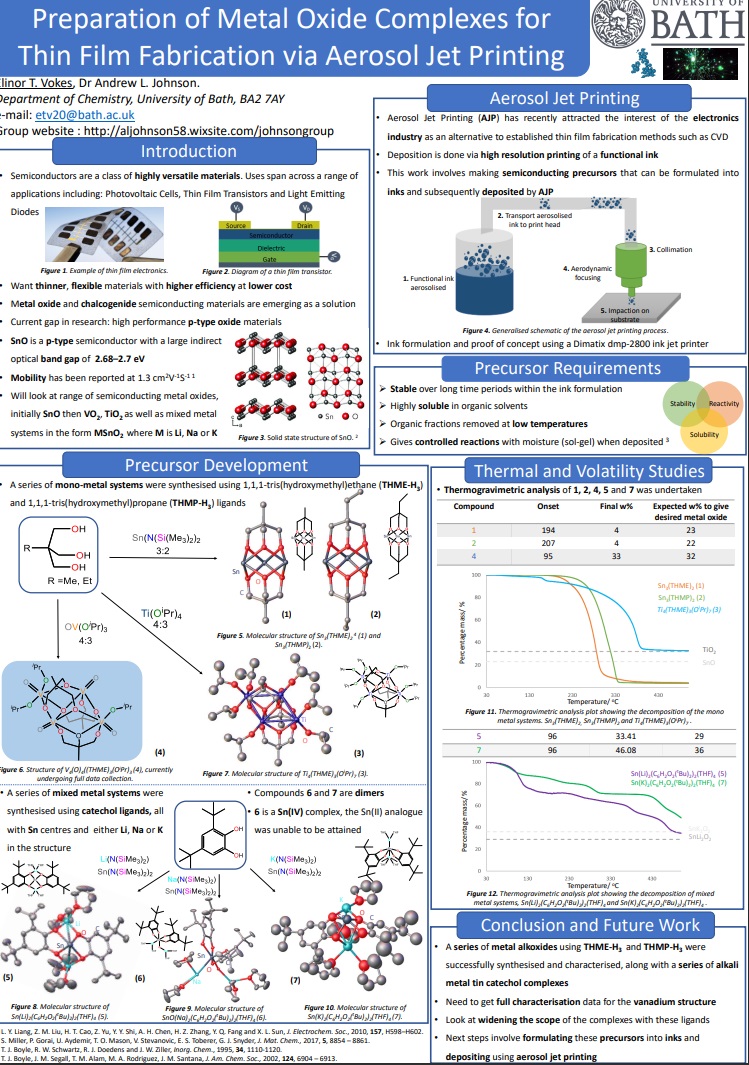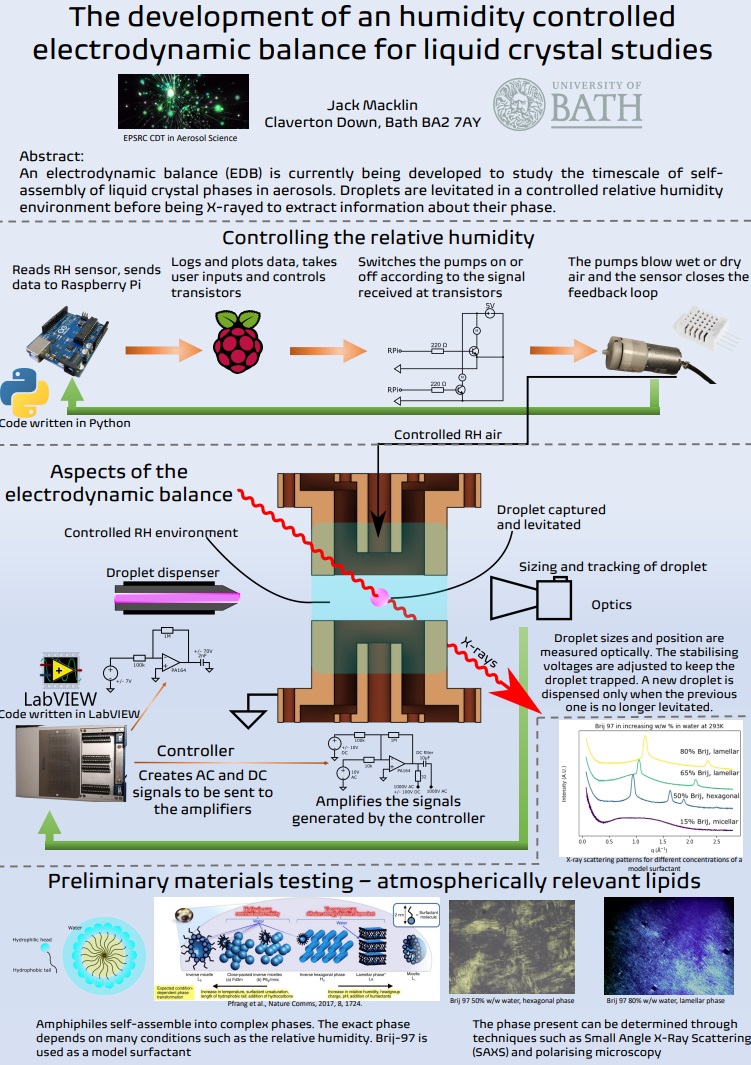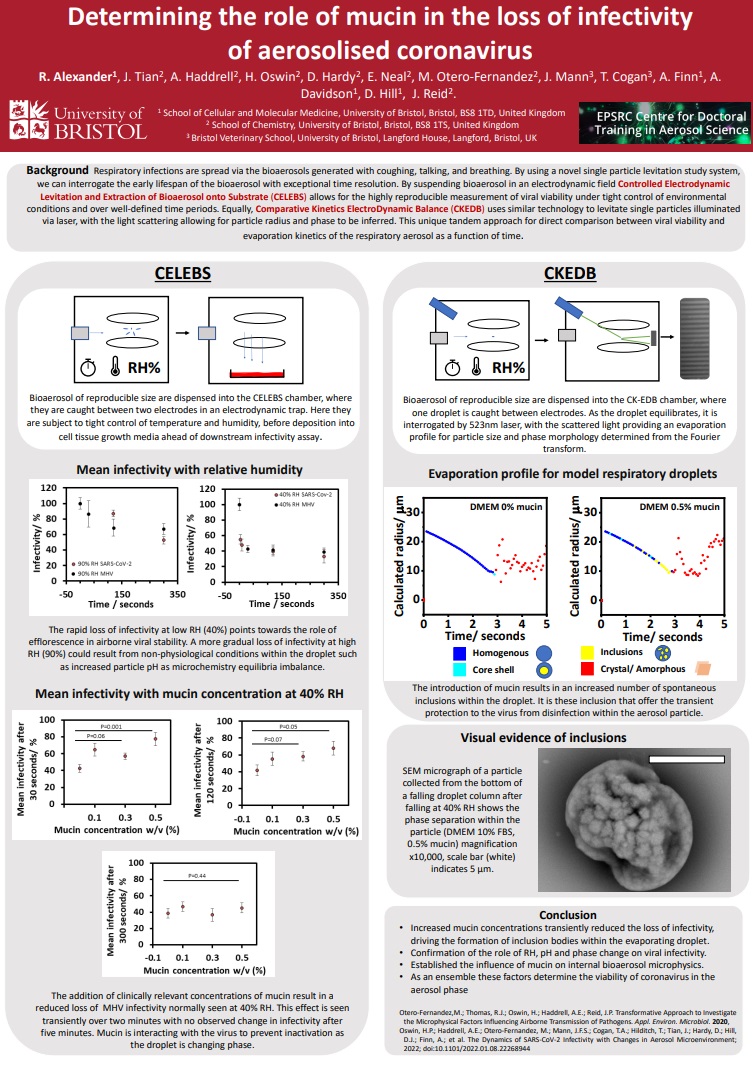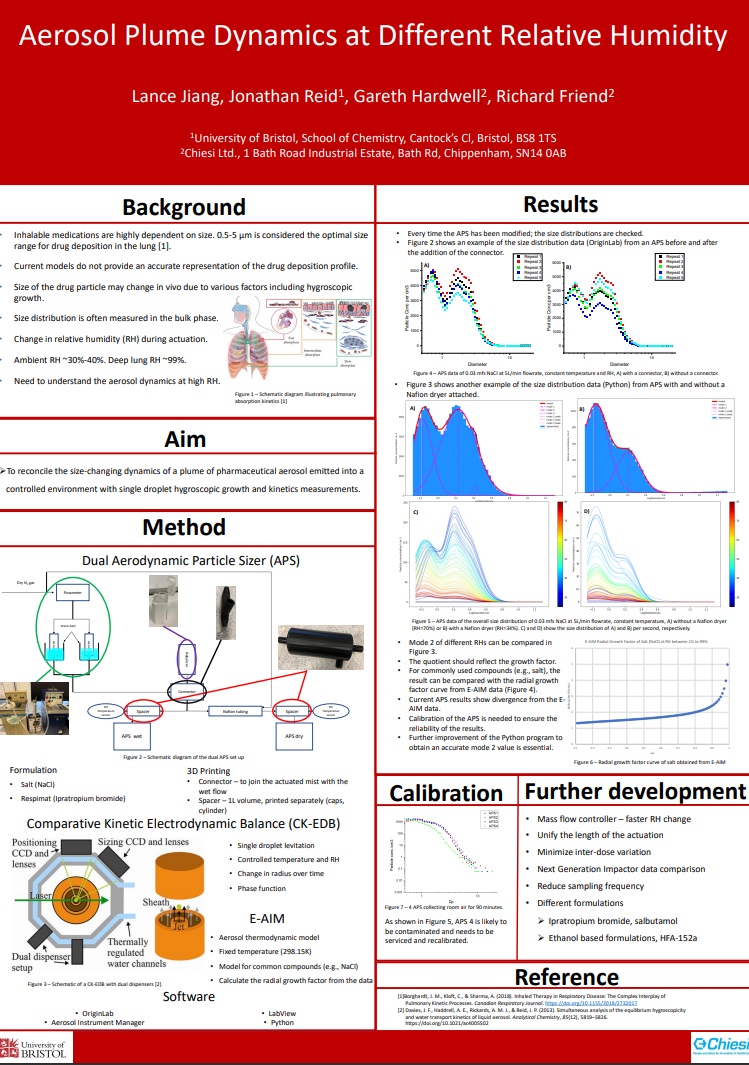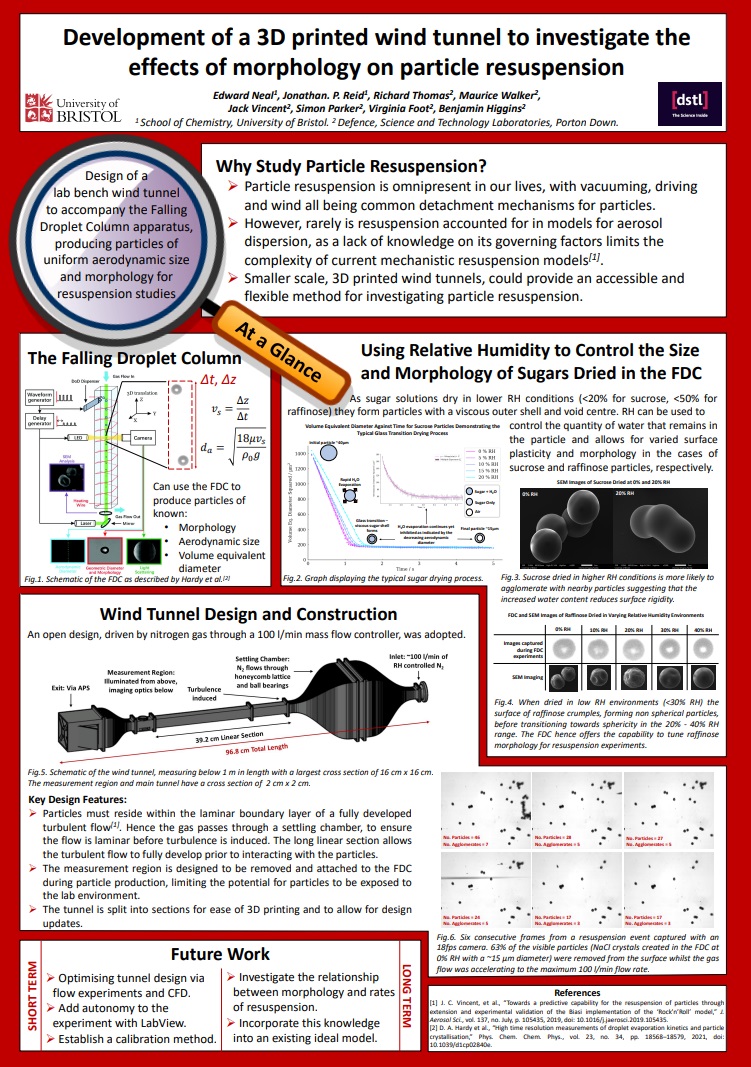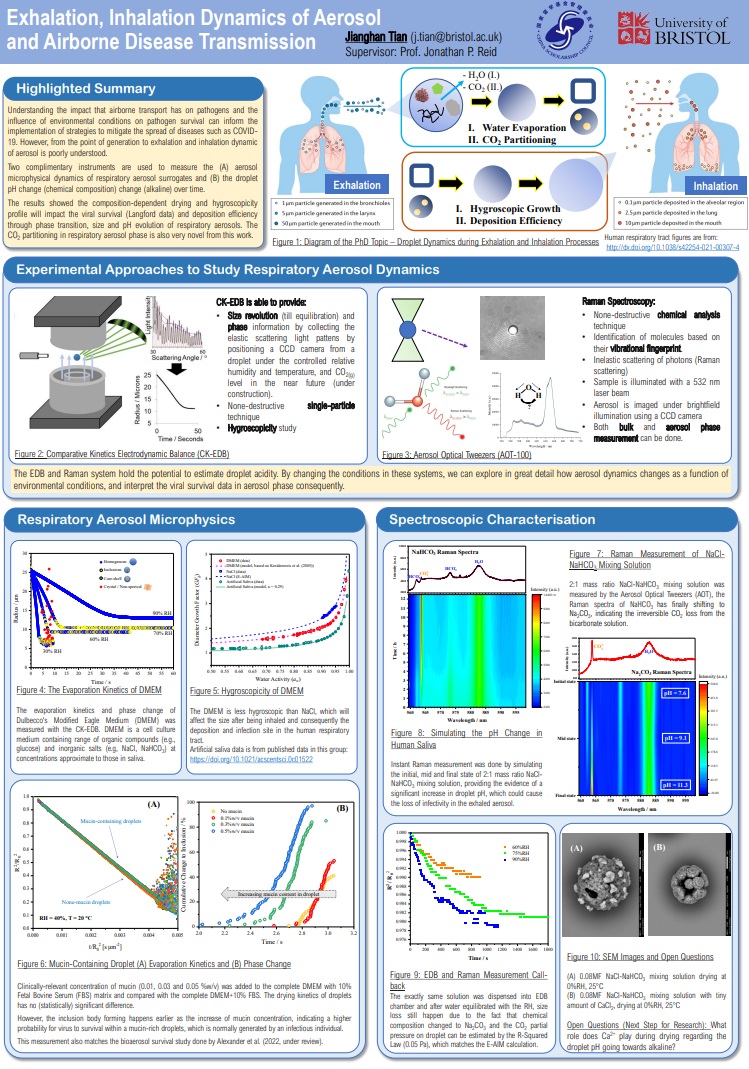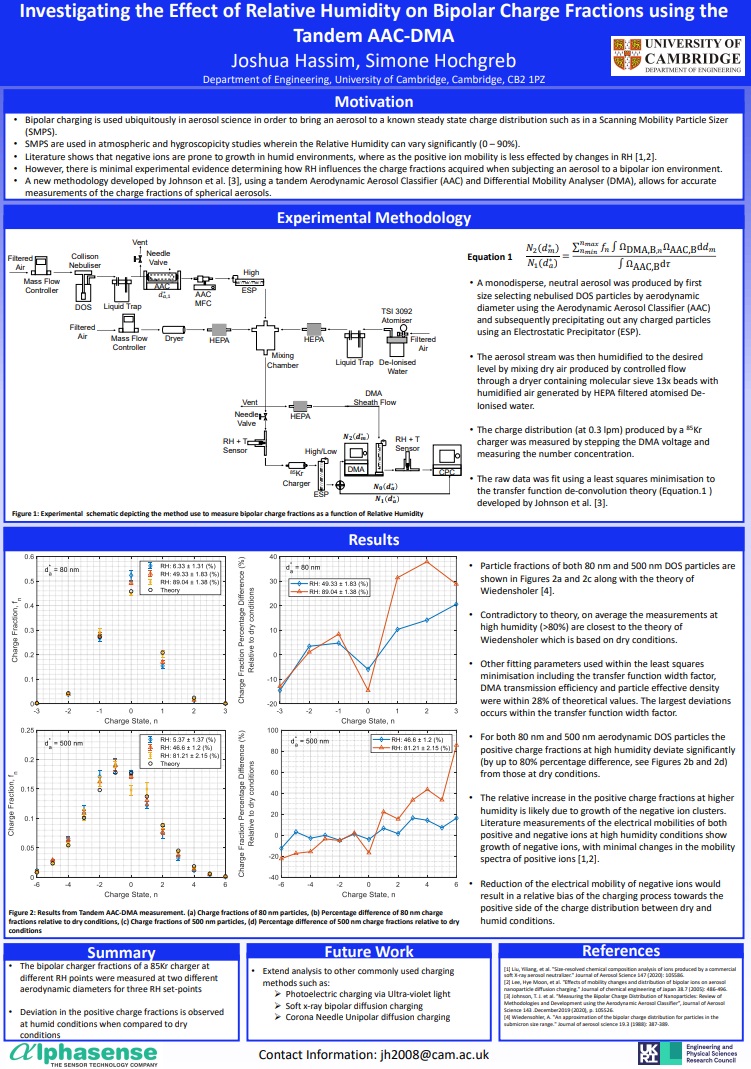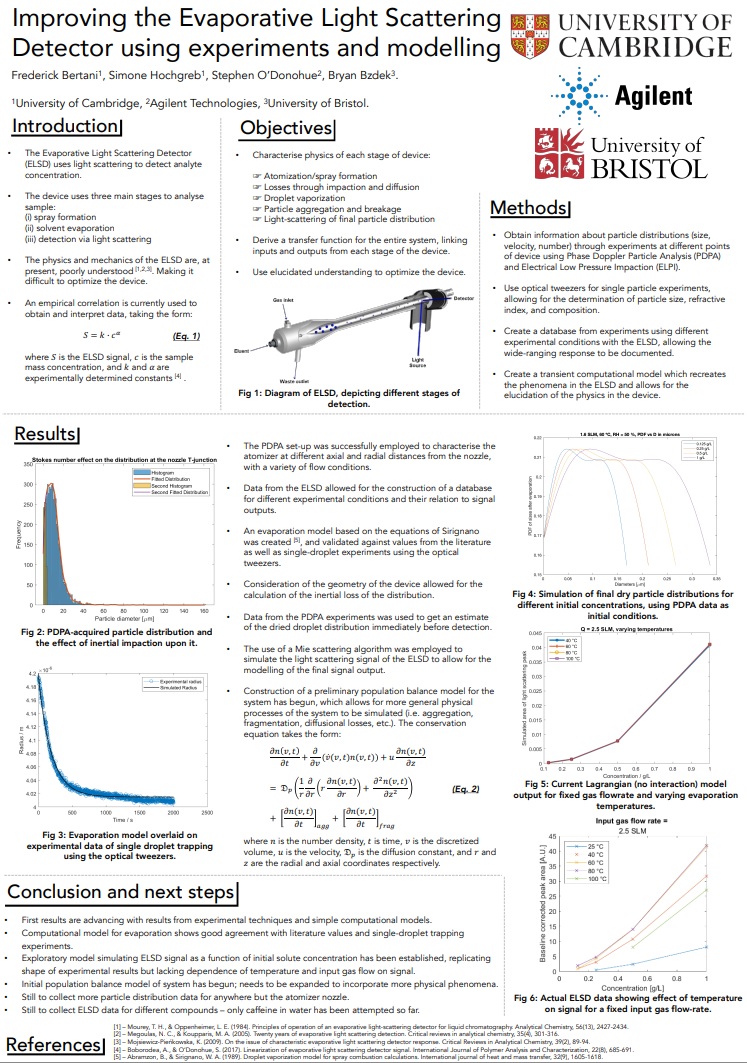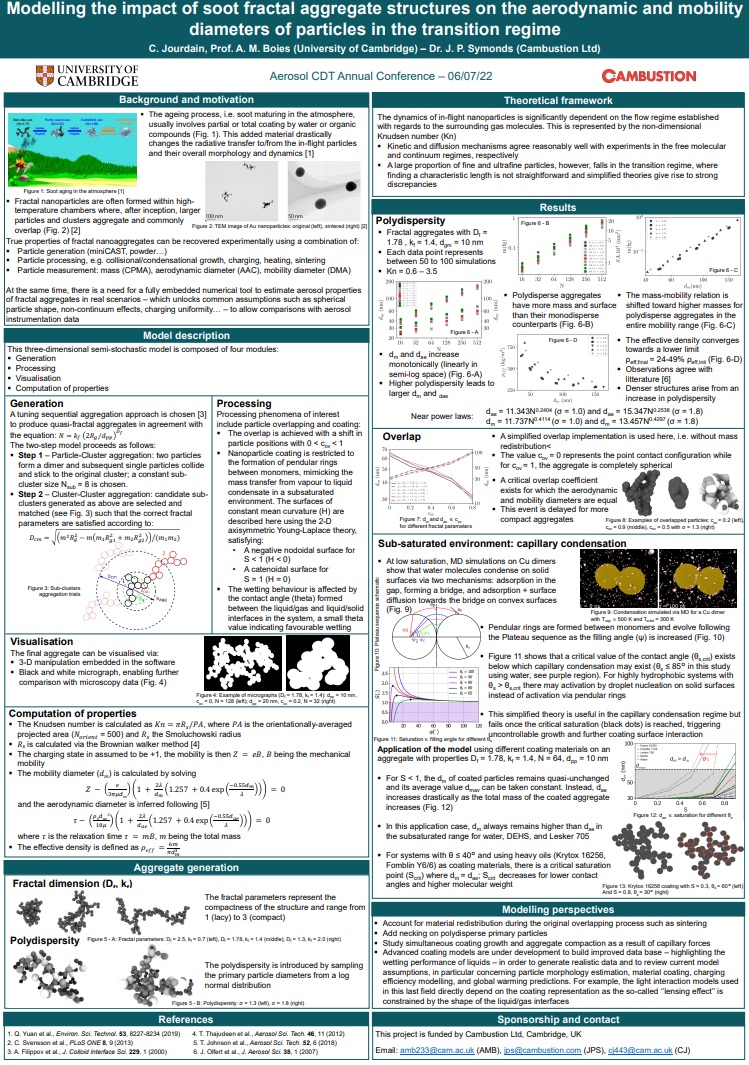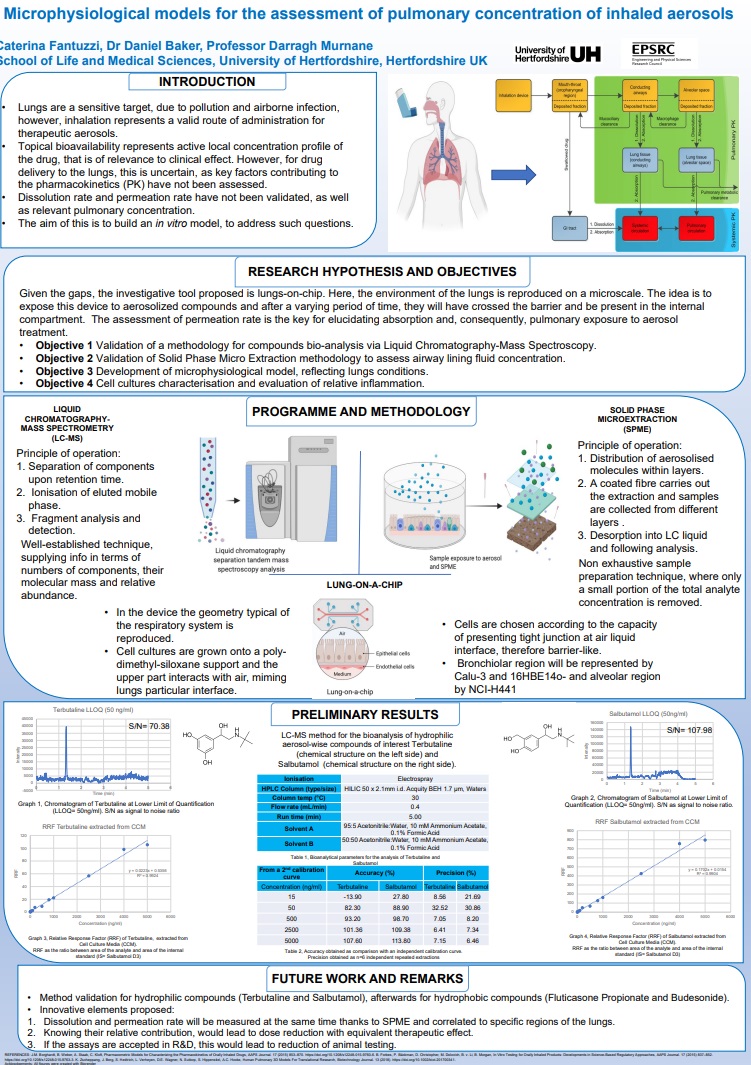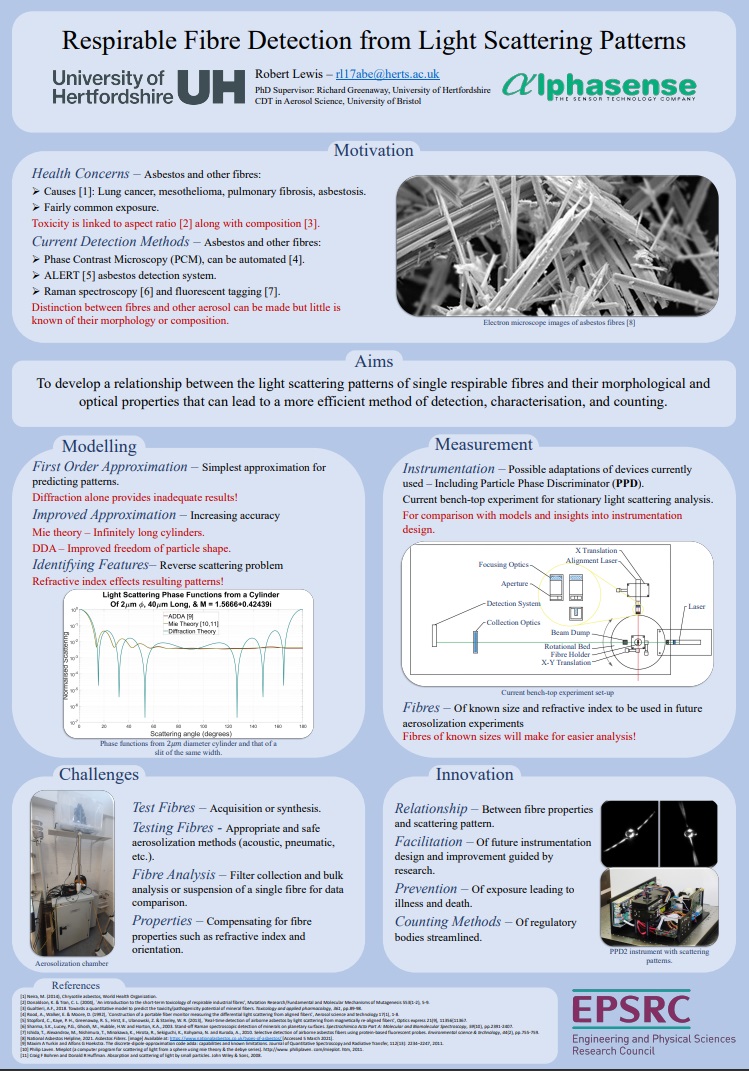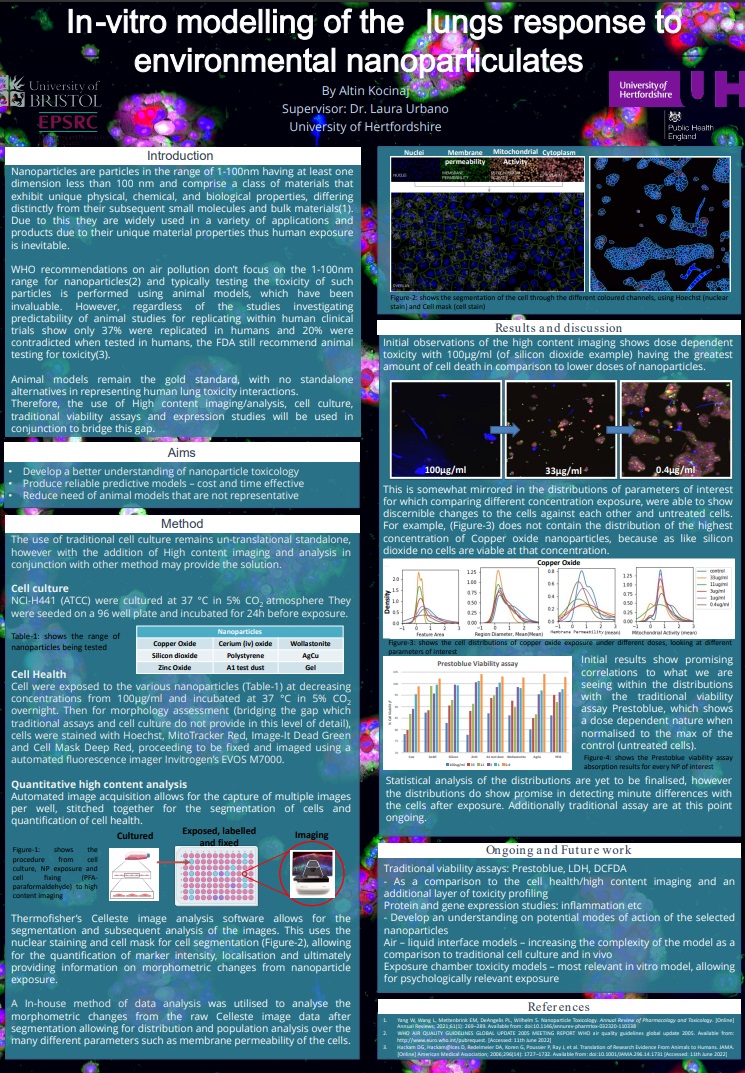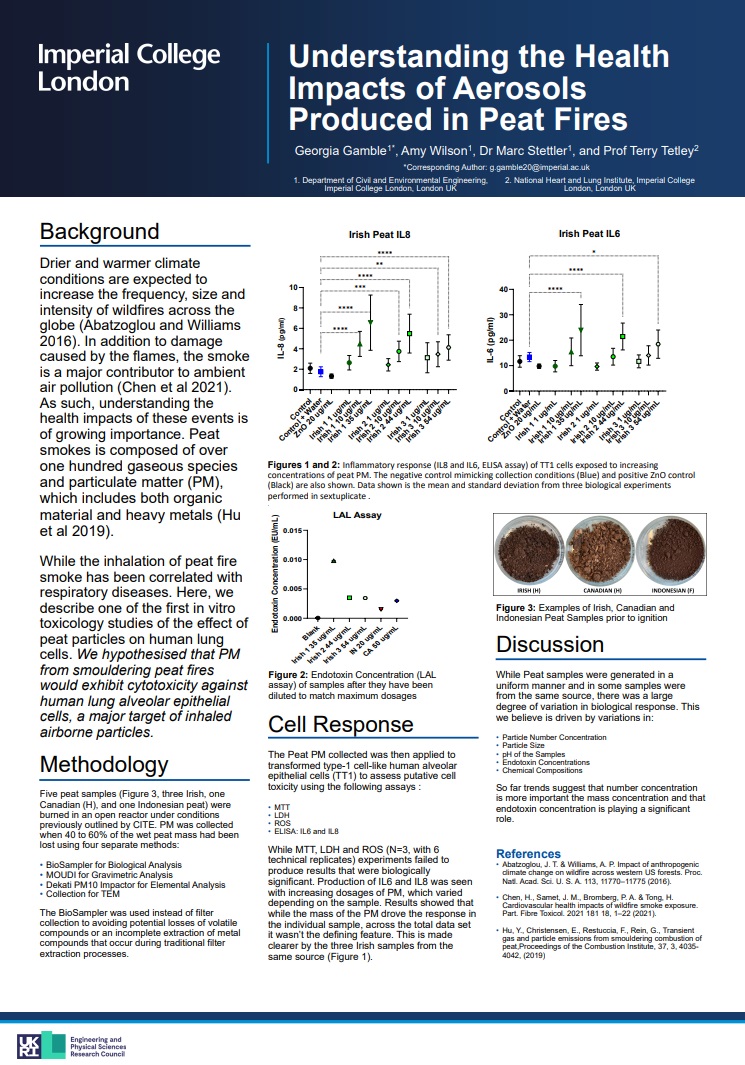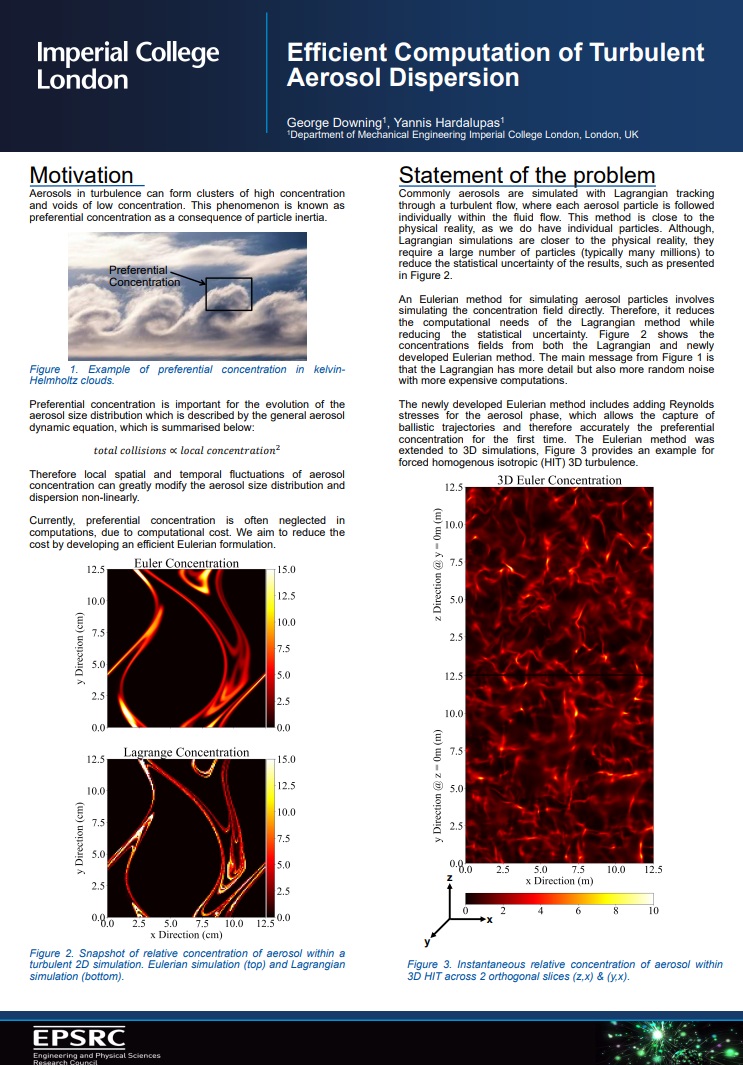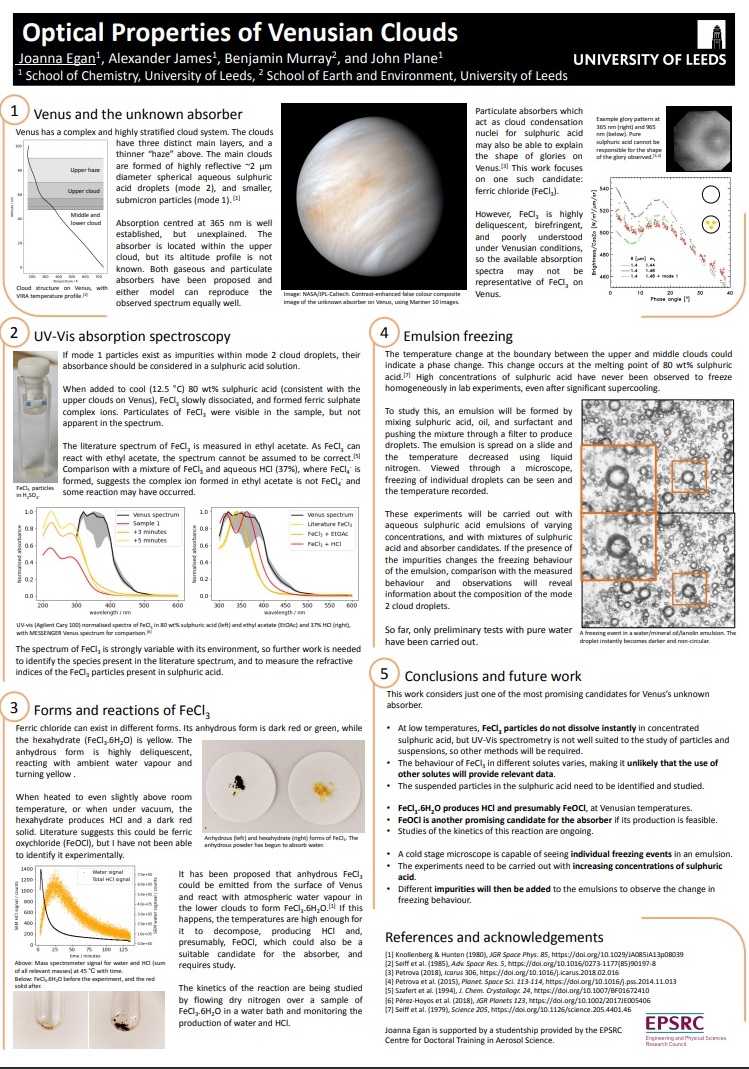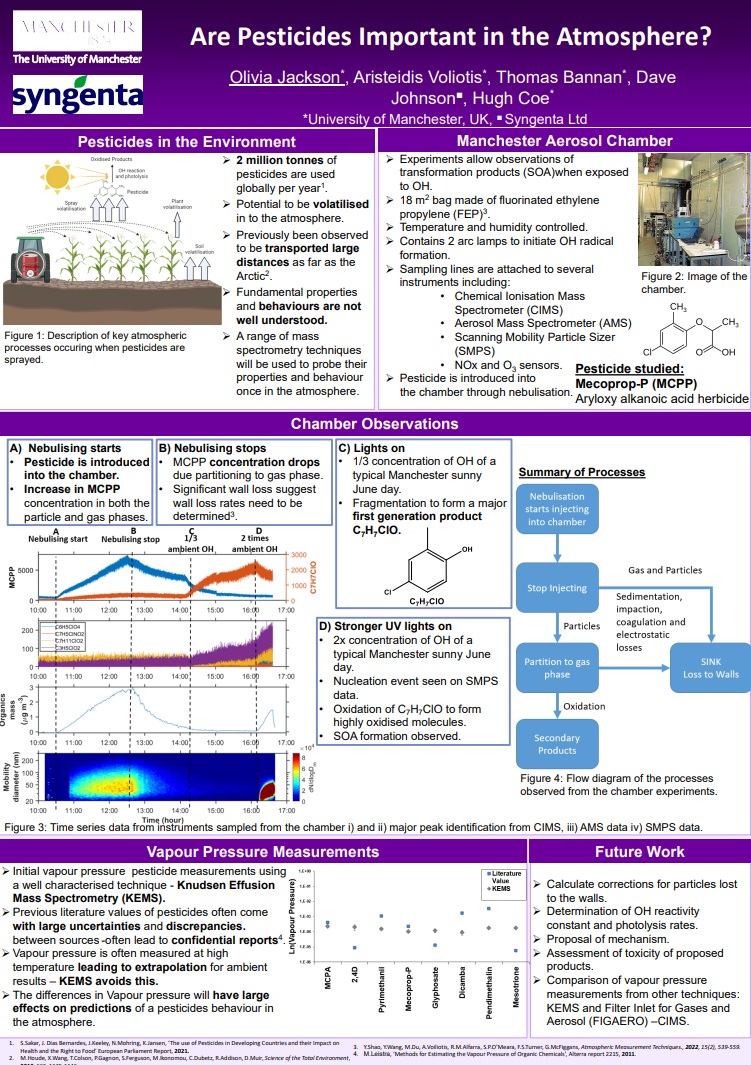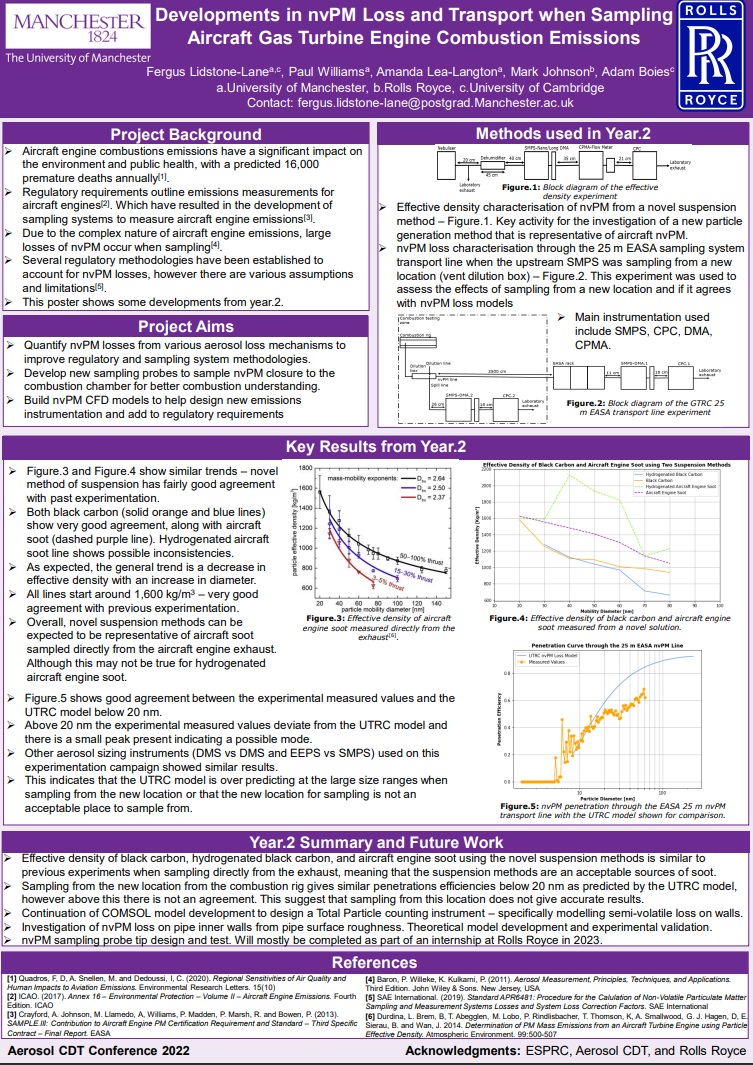PhD projects- Cohort 2 2020
PhD projects are hosted across the seven institutions; the Universities of Bristol, Bath, Cambridge, Hertfordshire, Imperial, Leeds and Manchester. The posters available to view here were presented by the cohort at the CDT’s Annual Conference on 6th July 2022:

Aerosol Jet Printed p- and n-type semiconductor Materials: Practical Routes to Printed Electronics
Theme: Aerosol technology
This studentship focuses on the development of new inorganic inks for the aerosol jet printing of p- and n-type semiconductor electronics. The project will involve the synthesis and characterisation of new nanoscale metal-oxide and metal-chalcogenide molecules for the formulation of new composite inorganic inks. The projects sits at the interface between molecular/materials chemistry and aerosol science, and is ideally suited for students with an interest in both inorganic and materials chemistry.
PhD student: Elinor Vokes
Supervisor: Dr Andrew L Johnson

Crystallisation in nano-droplets
Theme: Basic aerosol processes
In this project you will develop cutting-edge instrumentation to produce and study sub-nanolitre droplets as they evolve in a controlled vapour environment, observing crystallisation and phase changes in real time using imaging and x-ray scattering. With this instrumentation you will study the fundamental science underpinning atmospheric, industrial and pharmaceutical processes.
PhD student: Jack Macklin
Supervisor: Dr Adam Squires

Replication and modelling of infectious respiratory droplets in humans and animals
Theme: Aerosols and health
Using novel aerosol technologies with human and animal samples and pathogens for the first time, the project aims to understand how the changing environment of respiratory droplets influences pathogen viability and transmission. Such understanding through this interdisciplinary approach could aid development of strategies to prevent the spread of respiratory infections.
PhD student: Rob Alexander
Supervisor: Dr Darryl Hill

Aerosol Dynamics on Inhalation at High Relative Humidity
Theme: Basic aerosol processes
Aerosols are used to deliver drugs to the lungs to treat asthma and systemic diseases. The microphysical processes that transform the drug formulation on inhalation to the high humidity of the lungs (e.g. water condensation, dissolution) will be studied using single particle techniques with the aim of improving clinical efficacy.
This studentship is sponsored in partnership with Chiesi
PhD student: Lance Jiang
Lead supervisor: Prof Jonathan Reid

High-confidence modelling of particle resuspension
Theme: Basic aerosol processes
The resuspension of particles deposited on surfaces is a crucially important generation mechanism for biological, environmental and hazardous aerosol particles. Using cutting edge experiments and models, the nature of the particle-surface interaction (e.g. particle shape, surface roughness) will be explored and the resuspension mechanism directly probed by high frame rate imaging.
This studentship is sponsored in partnership with DSTL
PhD student: Edward Neal
Lead supervisor: Prof Jonathan Reid

Exhalation, inhalation dynamics of aerosol and airborne transmission disease
Understanding the impact that airborne transport has on pathogens and the influence of environmental conditions on pathogen survival can inform the implementation of strategies to mitigate the spread of diseases such as COVID. However, from the point of generation to exhalation and inhalation dynamic of aerosol is poorly understood.
PhD student: Jianghan Tian
Lead supervisor: Prof Jonathan Reid

Ice nucleation in aerosols containing biomolecules
Theme: Basic aerosol processes
Ice nucleation in environmental aerosols is an important atmospheric process, but many details are still poorly understood. This project addresses the physical chemistry of heterogeneous ice nucleation by bio-nanoparticles. You will develop apparatus to levitate and freeze water droplets, and gain relevant background through environmental modelling and interaction with the British Antarctic Survey.
Lead supervisor: Prof Walther Schwarzacher
Low-cost sensing of ultrafine aerosols: Sensor development and integration for first and second moment measurements
Theme: Measurement techniques
Sub-micron particulates are important pollutants, but difficult to measure with inexpensive methods. This project will use and further develop two low-cost sensors developed by the group to measure total particle area (nd2) or total particle length (nd) and thus diameter (d) in the atmosphere.
This studentship is sponsored in partnership with Alphasense
PhD student: Josh Hassim
Lead supervisor: Prof Simone Hochgreb
Improving Evaporative Light Scattering detector performance using experiments and modelling
Theme: Measurement techniques
Evaporative Light Scattering detectors are used with high performance liquid chromatography by collecting light scattered by droplets formed from separate analytes. The project will combine experiments with modelling and simulations for the nebulisation and evaporation process to allow the sensitivity of the detector to be improved.
This studentship is sponsored in partnership with Agilent Technologies
PhD student: Frederick Bertani
Lead supervisor: Prof Simone Hochgreb
Modelling the impact of soot fractal aggregate structures on the aerodynamic and mobility diameters of particles in the transition regime
The ageing process, i.e. soot maturing in the atmosphere, usually involves partial or total coating by water or organic compounds. This added material drastically changes the radiative transfer to/from the in-flight particles and their overall morphology and dynamics.
PhD student: Cyprien Jourdain
Lead supervisor: Dr Adam Boies

Collection methods for early detection of airborne viruses
Theme: Measurement techniques
Airborne aerosols are a primary transport mechanism for many diseases. Through experimentation, computational modelling and engineering prototyping, you will investigate aerosol capture mechanisms for effective real-time monitoring of disease transportation. This will include fundamental studies on the properties of the collected material and the principles of aerosol collection.
PhD student: Stanislaw Koper
Lead supervisor: Dr Daniel McCluskey

Microphysiological models for the assessment of pulmonary concentration of inhaled aerosols
Theme: Aerosols and health
There are significant gaps in our understanding of the links between aerosol deposition sites, binding to lung tissue and the time course of local drug concentrations during inhaled therapy. This project will combine emerging microfluidic, lung-on-a-chip technologies with liquid chromatography-mass spectrometry bioanalysis to explore the ‘holy grail’ of in-lung pharmacokinetics.
PhD student: Caterina Fantuzzi
Lead supervisor: Prof Darragh Murnane

Respirable Fibre Measurement from Light Scattering Patterns
Theme: Measurement techniques
Fibrous particle inhalation can cause a range of respiratory diseases. Current detection methods require filtration and manual counting under a microscope. You will work with state-of-the-art optical instrumentation to develop a technique for the real-time detection and measurement of airborne fibres.
PhD student: Robert Lewis
Lead supervisor: Dr Chris Stopford and Dr Richard Greenaway

In vitro modelling of lung response to environmental nanoparticulates
Theme: Aerosols and health
Environmental nanoparticulates can gravely impact health, leading to cardiopulmonary diseases and lung cancer. This project will bring together cutting-edge in vitro lung models, advanced deposition technologies and image analysis algorithms to characterise the lung tissue response to environmental nanoparticulate and to shed light upon their mechanisms of toxicity.
PhD student: Altin Kocinaj
Lead supervisors: Dr Laura Urbano and Prof Darragh Murnane

Evaluation of the health impacts of aircraft nanoparticles using a surrogate soot source and in vitro cell exposure
Theme: Aerosols and health
Aircraft engines emit nanoparticles that may have specific health consequences due to their size and composition, especially near airports. This project will develop a laboratory source of surrogate aircraft soot particles that will be deposited on cell cultures to evaluate cellular responses and advance understanding of nanoparticle health impact pathways.
PhD student: Georgia Gamble
Lead supervisor: Dr Marc Stettler

Smart filtration of aerosols in ventilation systems
Theme: Aerosol technology
Aerosols in ventilation systems of energy efficient buildings affect indoor air quality. The experimental and computational project examines the influence of flow speed, level of turbulence and aerosol size on aerosol tendency to concentrate and deposit in typical ventilation ducts. Findings will guide active and passive control for efficient filtering.
PhD student: George Downing
Lead supervisor: Prof Yannis Hardalupas

Optical Properties of Venusian Clouds
Theme: Atmospheric and environmental aerosol
Venus is completely shrouded in thick clouds. This project will investigate the curious blue absorption in the clouds, which is responsible for the yellowish appearance of the planet and remains unexplained. Laboratory optical studies of candidate cloud droplets, combined with atmospheric modelling, will be used to unravel the mystery.
PhD student: Joanna Egan
Lead supervisor: Prof John Plane

Towards a better understanding of the lifecycle of Pesticides in the Atmosphere
Theme: Atmospheric and environmental aerosol
Pesticides are widely used throughout the world and are essential components in the efficient production of food. However, their atmospheric cycles remain very important and poorly understood transport pathways. You will use a range of advanced aerosol tools and techniques to constrain atmospheric behaviour combining both laboratory and field studies
This studentship is sponsored in partnership with Syngenta.
PhD student: Olivia Jackson
Lead supervisor: Prof Hugh Coe

Particle Transport and Losses in Sampling Aircraft Gas Turbine Engine Combustion Emissions
Theme: Measurement techniques
Understanding soot formation and transport at the interface between engine exit and the combustor of a large gas turbine aircraft engine remains a significant challenge. This project will look to elucidate the problem, working closely with Rolls Royce, and will ultimately lead to a better understanding of the environmental impact of engines.
This studentship is sponsored in partnership with Rolls Royce.
PhD student: Fergus Lidstone-Lane
Lead supervisor: Dr Paul I Williams

EPSRC CDT in Aerosol Science
University of Bristol
School of Chemistry
Cantock's Close
Bristol, BS8 1TS
aerosol-science@bristol.ac.uk
Partner Newsletter
Sign up to receive monthly news and updates from the CDT in Aerosol Science, as well as events, training and research webinars.

